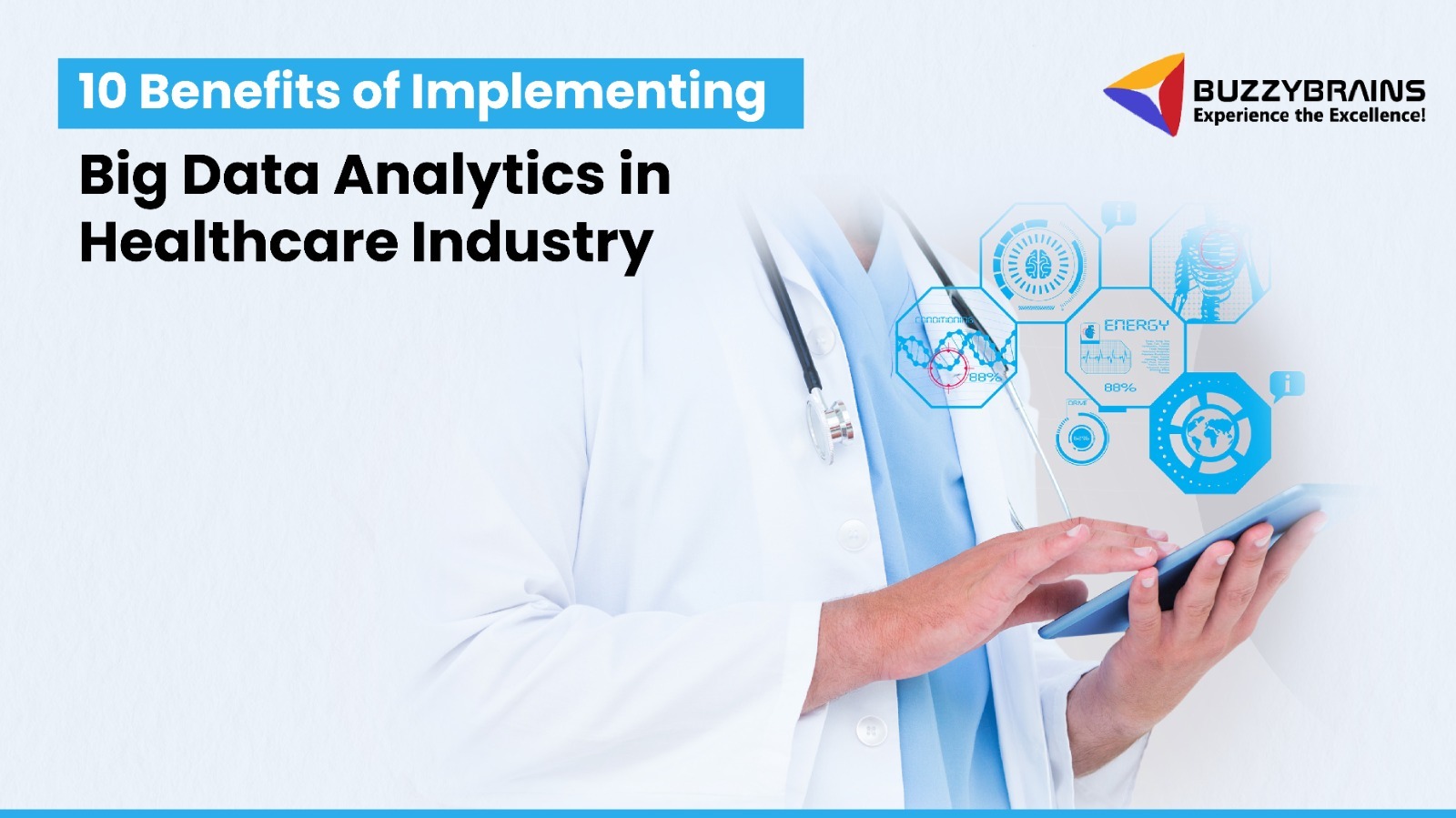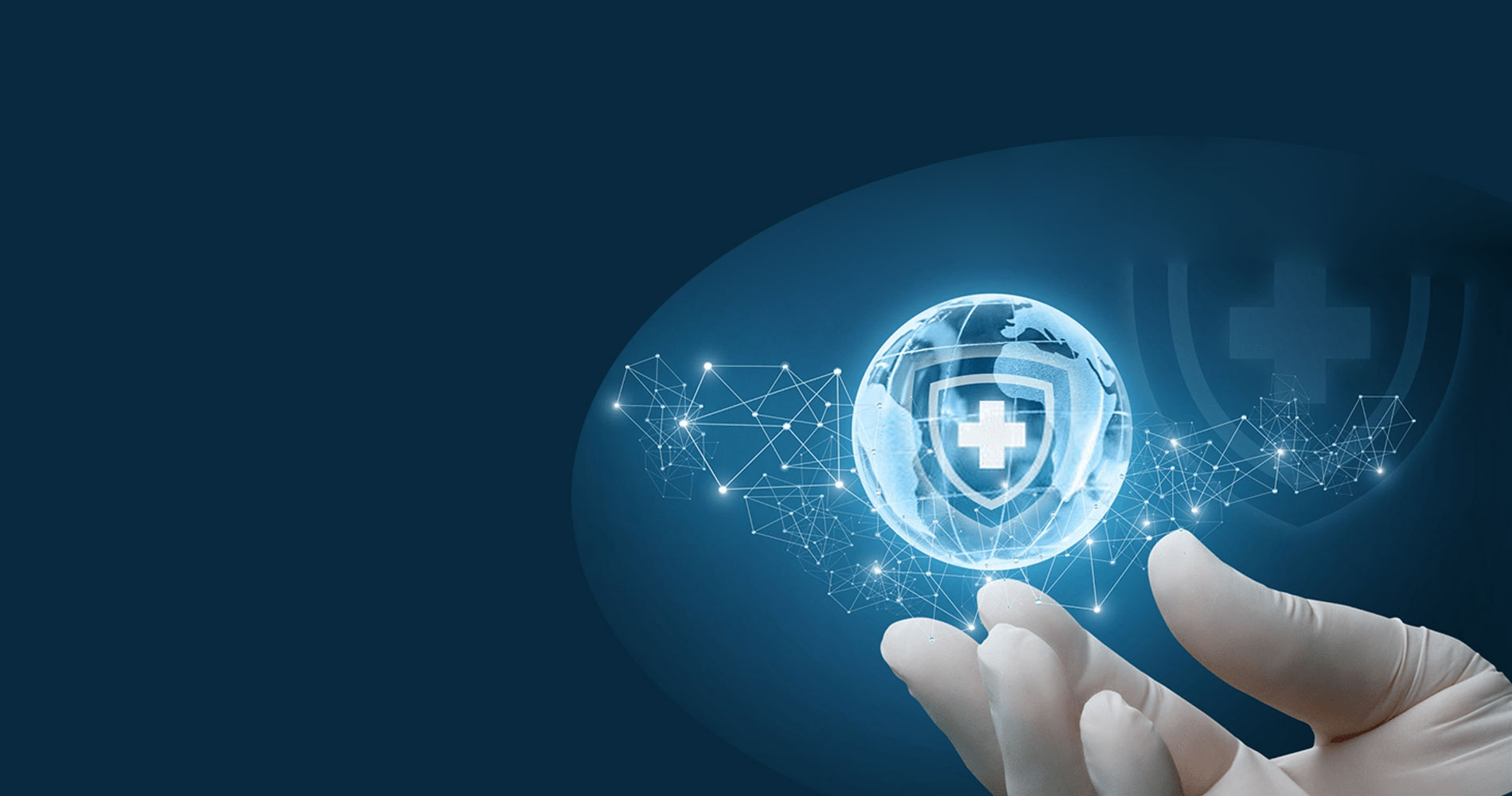Benefits of Implementing Big Data Analytics in Healthcare Industry

- What Are Big Data Analytics in Healthcare?
- How Has the Healthcare Industry Evolved With Data And Analytics Over Time?
- Top 10 Benefits of Big Data Analytics in Healthcare
- How to Ensure Data Integrity and Security in Healthcare?
- What to Consider When Choosing Big Data Analytics for Healthcare?
- Use Cases/Example of Big Data and Data Analytics in Healthcare:
- FAQs about the Benefits of Big Data Analytics in Healthcare
- Conclusion
- How BuzzyBrains Can Help with Implementing Big Data in Healthcare
What Are Big Data Analytics in Healthcare?
Big data is at the helm of many industries, globally. From finance to tech and healthcare, the success of multiple sectors directly or indirectly depends on the advancement of big data. For instance, the global Big Data and Analytics market is worth USD 274, and within the healthcare industry, Big Data’s impact is expected to reach USD 79.23 billion by 2028.
Thus, such numbers are an apt testament to the scope and potential of Big Data. When we talk about healthcare and Big Data, the latter is available in massive amounts, containing pivotal information on human health conditions and activities, and is collected through multiple resources like electronic health records, medical image analysis, wearables, medical devices, and more.
Related Blog: Big Data Analytics in Healthcare: A Comprehensive Guide
How Has the Healthcare Industry Evolved With Data And Analytics Over Time?
The healthcare industry has evolved by leaps and bounds in the past few years because of big data. Health analytics premised on big data has facilitated the process of aggregating and evaluating current and historical industry data to predict trends, improve outreach, and foster better management of business practices and the spread of diseases.
Analytics in healthcare with Big Data as the epicenter has been a significant difference in today’s treatments and facility management. Initially, data was stored in hard copy form, but many healthcare organizations are becoming more efficient and effective through the incorporation of software and technology.
Now that we have touched upon the basics of Big Data in healthcare analytics, let us gauge a few of its benefits.
Top 10 Benefits of Big Data Analytics in Healthcare
- Improved Patient Care
Big Data means more information about patients, which bolsters the scope and potential of understanding the patient experience and enhancing the overall care they receive. - Better Research
Big Data provides medical researchers access to a labyrinth of near-infinite data and methods of data collection. Thus, the scope of ushering in revolutions and breakthroughs within the medical field because of robust research and development also increases. - Smarter Treatments
The third major benefit of Big Data in healthcare analytics is improvement in treatment plans. By gauging and examining the treatments that helped patients and those that did not, it is possible to curate better plans for future patients. - Reduced Costs
Big data also makes it possible to reduce the cost of obtaining and providing high-quality healthcare by offering appropriate treatment plans, optimal and organized resource allocation, and preemptive identification of problems even before they creep up. - Healthcare Tracking
Big Data when combined with the Internet of Things (IoT) also facilitates tracking the healthcare of a patient. Big Data makes it possible to track a patient’s sleep patterns, and lifestyle, but also their heart rate, blood pressure, and more. - Additional Help to High-risk Patients
Big Data also helps offer high-risk patients with timely, meticulous, and customized care, and thus, streamlines the entire healthcare process. - Prevention of Human Errors
Mistakes have no place in the world of healthcare. However, human errors are bound to happen. It is quite common to hear some healthcare professional somewhere dosing the patient with the wrong medicines. The repercussions of such mistakes are incredibly costly.
However, big data can help reduce the possibility of these mistakes by dissecting client information and endorsing the right prescription. In today’s day and age, when healthcare professionals are all overburdened, the feature can be of phenomenal help. - Patient Satisfaction
The eighth benefit of big data in healthcare analytics revolves around patient satisfaction. Most healthcare organizations are concerned about healthcare participation and satisfaction. But, with the help of wearables and other healthcare tools, doctors may play a more active role in patient preventive care. Besides, consumers can also become more mindful about their health. Not only does the interaction between patients and doctors is strengthened, but also hospitalization levels are reduced and serious health concerns are mitigated. - Overall Advancement
Overall Advancement in Healthcare Sectors – One of the biggest roles that big data analytics can play in healthcare is bolstering and improving the overall sector by facilitating science and technological advancements. - Fraud Detection
Last but not least, fraud detection is another major benefit of big data in healthcare analytics. Although in its earlier stages, big data can vehemently assist in detecting fraud in healthcare systems more rapidly and more effectively by altering the payment systems for medical claims in tandem with analytics to make the process of checking accuracy and integrity claims easily. By mitigating the number of false or misrepresented statements, healthcare agencies are saving time and money.
How to Ensure Data Integrity and Security in Healthcare?
Surprisingly or unsurprisingly, the healthcare industry remains one of the most targeted industries for cyber-attacks, owing to the high value of protected health information (PHI). The average cost of a healthcare data breach has touched a whopping threshold of USD 9.23 million in 2021.
Thus, the jarring numbers are proof that IT security is a crucial aspect that needs immense and immediate attention. One cannot underestimate the importance of data security in healthcare in any way. To the untrained eye, it might seem that cybercriminals usually attack large healthcare institutions, but they do not discriminate in their tactics. In fact, small healthcare practitioners are more vulnerable to cyber-attacks. Some of the ways to ensure integrity and security in healthcare –
- Set up the right digital infrastructure
- Provide continuous employee support
- Create regular data backups
- Implement strict access and usage controls
- Audit your data frequently
What to Consider When Choosing Big Data Analytics for Healthcare?
The first thing to consider when choosing big data analytics for healthcare is to understand what you are working with. The majority of healthcare providers might not be equipped with the complete set of tools to become a fully data-driven organization. Thus, the key is to conduct a thorough self-assessment to truly understand what an institution possesses, what they need, and what needs to be replaced.
For instance, systems that generate lots of data but cannot reproduce meaningful and digestible reports may need to be replaced by ‘smarter’ tools that delve and touch the crux of the matter more quickly. Likewise, it is also important to decide what you want to do and who is going to do it.
Use Cases/Example of Big Data and Data Analytics in Healthcare:
Big data analytics has been the ‘tour de force’ of the contemporary healthcare terrain. We have multiple tangible examples that prove how succinctly big data has been for health and healthcare organizations.
One of the most current and relevant examples of big data in healthcare is the global Coronavirus pandemic. It was big data that facilitated the rapid development of COVID-19 vaccines. Besides, big data analytics also helped predict the spread of the disease by allowing healthcare professionals to process all the available data in a timely fashion.
The second example of big data analytics in healthcare pertains to preventing opioid abuse in the United States. Overused opioids have caused more accidental deaths in the United States than road accidents, and the problem is now seen as a national crisis. However, big data consisting of insurance and pharmacy statistics have enabled us to predict with a high degree of accuracy if someone is vulnerable to overdose and opium abuse; thereby, uprooting the problem from its origin.
FAQs about the Benefits of Big Data Analytics in Healthcare
Q1. How does big data analytics enhance patient care and treatment outcomes?
Ans. Big Data analytics provide crucial insights into clinical data, thereby fostering informed and improved decision-making about diagnosis, treatment of patients, prevention of diseases, and more. The culmination is an overall enhancement of patient care and treatment outcomes.
Q2. Can big data analytics help improve operational efficiency in healthcare organizations? If so, how?
And. Yes, big data analytics can help improve the overall efficiency of healthcare organizations. By streaming data management of patients, reducing human errors, improving health tracking, and more.
Q3. Can big data analytics be effectively integrated with existing healthcare systems and technologies?
Ans. Yes, it is possible to effectively integrate data analytics with existing healthcare structures. Tools such as wearables, investing in the right digital infrastructure, and so forth, can go a long way in fueling the process.
Q4. Are there specific skills and training requirements for utilizing big data analytics in the healthcare sector?
Yes, specific skills are required for utilizing big data analytics in the healthcare sector. Some of these skills are –
- Knowledge of mathematics and statistics
- Proficiency with data storage, data wrangling, data warehousing, and mining
- Familiarity with programming languages like Python, R, SQL, and more
- Experience with Microsoft Office, especially Excel
- Understanding of data analytics and visualization tools
- Enthusiasm for working at the intersection of healthcare and technology
Conclusion
So, there we have it, a crisp overview of big data analytics in healthcare. Big data is a towering force with crucial significance within the domain of health and well-being. From facilitating preventative technologies to curative care, the potential of big data in healthcare is near-infinite.
The future scope and potential of big data analytics in healthcare are vast and expansive. We can expect big data to become a buzzword, and infiltrate across nooks and crannies of the healthcare terrain. Besides, it can also be expected to see many verticals adopting technology that supports greater analytical capabilities.
How BuzzyBrains Can Help with Implementing Big Data in Healthcare
Are you ready to bolster your healthcare business with big data, while ensuring the most stringent security measures? If yes, then look no further than BuzzyBrains. We specialize in data analytics in healthcare and can help create tools that vehemently streamline operations. From conception to launch, our team delivers cutting-edge solutions that engage users and drive success.
Our proud and dedicated team builds software for small business enterprises and startups using disruptive technologies. Besides big data and healthcare analytics, you can count on us for all things IT, such as app development, product development cloud management, and much more. So, do not wait any longer, reach out to us today and take the first step toward a more successful business venture with BuzzyBrains.
